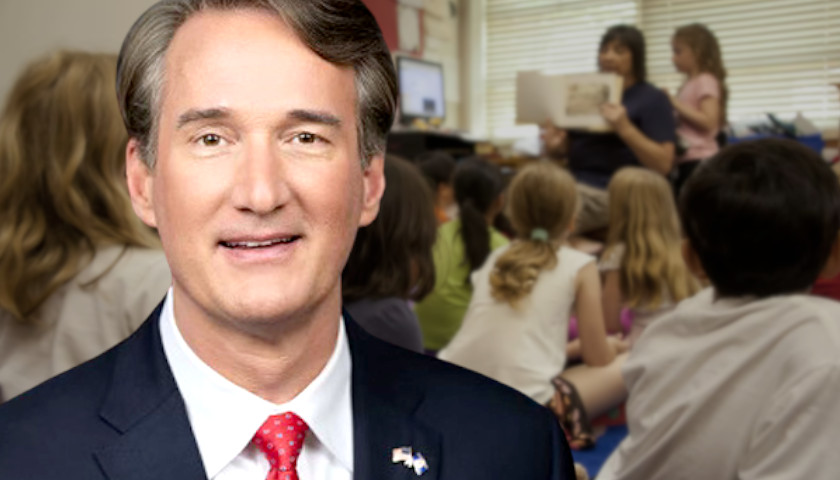Governor Glenn Youngkin received two major education policy wins Wednesday from the Democrat-controlled Virginia Senate, which passed Senator Siobhan Dunnavant’s (R-Henrico) bill requiring parental notification of sexually explicit instructional material in public school classes. State Senators Lynwood Lewis Jr. (D-Accomack) and Montgomery “Monty” Mason (D-Williamsburg) voted with all the Republicans to pass the bill 20 to 18.
Dunnavant said, “Senate Bill 656 is a bill that we discussed and passed out of this body before that seeks to inform parents when controversial, sexually explicit material is being discussed in the classroom. It has nothing to do with libraries. It has an enactment clause that specifically protects books and ensures that it does not censor books.”
“As the mother of four, I can tell you that my children’s education was an opportunity to discuss with them things that were difficult, things that people had different opinions on,” she said. “Parents and teachers are united in the effort to educate, inform, and prepare their children. And therefore they all need to have equal awareness of what’s being discussed.”
The General Assembly passed and former Governor Terry McAuliffe vetoed a similar bill during his term, and that record became a central issue during the 2021 election cycle when outrage over sexually explicit books in schools and the need to increase parental oversight in schools became a key Republican issue.
Last week, the Senate Committee on Education and Health voted to advance the bill with support from Lewis and State Senator Chap Petersen (D-Fairfax City.) Petersen voted against the bill on the Senate floor Wednesday but didn’t speak against it.
In an email update, The Family Foundation President Victoria Cobb reported on the vote, “The moment was not without some drama, as we learned right before the Senate took the floor that Senators Chap Petersen (D-Fairfax) and Lynwood Lewis (D-Accomack), both of whom helped to move the bill through the Senate Education and Health committee, were wavering. We were also excited to see Senator Monty Mason (D-Williamsburg) decided to join with Republicans to vote in favor of the bill.”
State Senator Ghazala Hashmi (D-Chesterfield) spoke against the bill in committee and again on the Senate floor.
“I know that the Senator from Henrico has argued that this is not a censorship bill. But in fact, this is what it comes from and this is what it leads to. It is this understanding that somehow there are materials that should be not made available in school classrooms. I would argue that we need to place trust in our educators, that they understand what is age-appropriate material, would also argue that parents have every opportunity and every right to determine if some material is not appropriate for their children,” Hashmi said.
She cited The Canterbury Tales and Shakespeare’s work as potentially objectionable classroom material, and said, “However, it’s not Chaucer, it’s not Shakespeare. Invariably, it is the writing of black and brown authors. We’ve seen this debate take place publicly in the writings particularly recently of Toni Morrison, most explicitly around the novel Beloved. And these are the potential harms that’s contained in this legislation, that we expose opportunities for our children to be shielded from important conversations, important works of literature that they really need to engage in.”
Many of the state Senate Republicans spoke in favor of the bill.
State Senator Bill Stanley (R-Franklin) said, “This is not matter of censorship. This is a matter of notification, notification between that entity that educates our children in the public system and the parents whose number one role, the primacy, is to be a parent and make those determinations for their children before they become adults of what they learn about, what they’re exposed to.”
State Senator Richard Stuart (R-King George) responded to Hashmi’s speech.
“If I understand what she said correctly, she said that there was certain content that children needed to be exposed to and essentially we shouldn’t pass a bill like this, that notified parents of that content, because they may object to it,” he said. “And Madam President, I submit that’s the whole point of this bill. Because the people in this body don’t get to substitute their judgement for that of the parents.”
Senate Democrats have said they’re a brick wall standing against Republican policy from the House and the governor’s office, and they have defeated several major Republican policies, including on education. But the recent passage of a school masking opt-out bill and the passage of SB 656, along with potential support from some Democrats on charter schools, highlight the lack of complete unity on specific education policies. In the 21-19 Democrat-controlled Senate, Youngkin only needs one Democrat to side with Republicans.
Youngkin praised the vote in a Wednesday press release: “Since the very beginning, I have advocated to give parents a voice and a say on whether their children can receive alternative reading materials because Parents Matter. The passage of this bill, signals to schools that parents will not be silenced. Notifying parents is just commonsense, and I look forward to signing it when it reaches my desk.”
– – –
Eric Burk is a reporter at The Virginia Star and The Star News Network. Email tips to [email protected].





